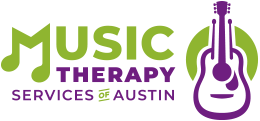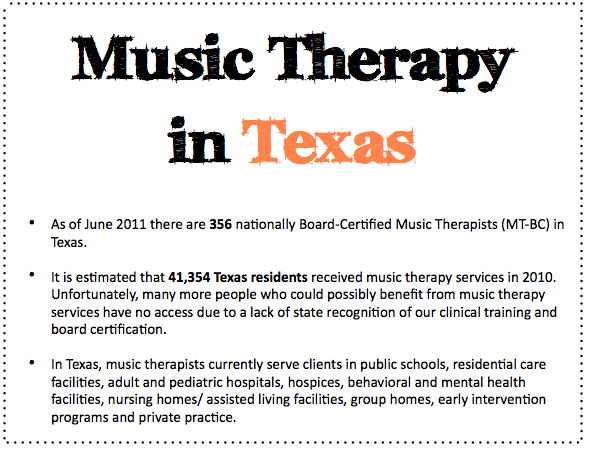How YOU can advocate for music therapy!
Introduction: Advocacy –> Recognition –> Access
Since 2005, the American Music Therapy Association and the Certification Board for Music Therapists have collaborated on a State Recognition Operational Plan. The primary purpose of this Plan is to get music therapy and our MT-BC credential recognized by individual states so that citizens can more easily access our services. The AMTA Government Relations staff and CBMT Regulatory Affairs staff provide guidance and technical support to state task forces throughout the country as they work towards state recognition. To date, their work has resulted in 35 active state task forces, 2 licensure bills passed in 2011, and an estimated 10 bills being filed in 2012 that seek to create either a music therapy registry or license for music therapy. This month, our focus is on YOU and on getting you excited about advocacy.

I am proud to be a music therapist. Therefore, I advocate in any and every way possible. When I was approached to be a part of music therapy advocacy month with music therapy bloggers across the nation, I was honored, excited, and eager to share! In addition to blogging, the list below contains ideas as to how I advocate for my services and career (and how YOU (as a music therapist or a music therapy supporter) can, too!)
1. Share newspaper articles via Facebook and Twitter
2. Inform your local newspaper about music therapy services that are happening in their community.
3. Provide evidence-based articles and materials, along with personal anecdotes and demonstrations, to therapy clinics, nursing homes, hospitals, and other potential work sites.
4. Speak at local club meetings in the area, such as Kiwanis and Rotary.
5. Be a part of local support groups. 6. Join your state’s task force committee!
7. Talk with your local legislators
I thoroughly enjoy being a part of the Texas task force committee, as it provides me with the opportunity to truly make an impact with the state government in terms of how music therapy is recognized. Why state recognition? Through state recognition several things happen: no one would be allowed to practice music therapy without the board certification credential (MT-BC), which eliminates just anyone calling themselves music therapists, it would also increase the awareness of our profession across the state and, ultimately, creating more job opportunities for music therapists and opportunities for clients to elect music therapy as a service to help them with their behavioral, emotional, cognitive, and physical areas of need.
I’d love to hear about YOUR advocacy experiences, journeys, and where/how you advocate!



